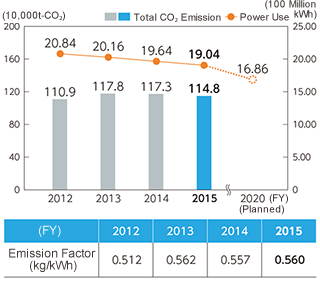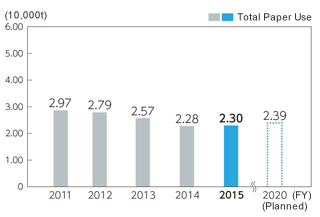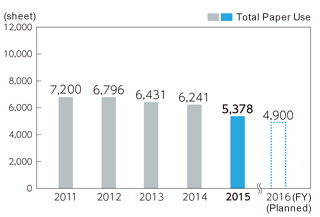Environmental Grand Design Achievement of the Environmental Grand Design
Reduction in Power Use
In FY 2015, the amount of power used by the NTT West Group was reduced by about 59 million kWh compared to FY 2014, which leads to a reduction of 25,000 t-CO2 compared to FY 2014 in terms of the total CO2 emission. This is equivalent to the amount of CO2 that can be absorbed by about 1.79 million Japanese cedar trees in a year.

- (Note) This value is calculated by NTT West Group based on the weighted average of the emission factor released yearly by electricity providers according to the amount of power used by the respective providers.
Reduction of Paper Use
At NTT West Group, paper is used for telephone directories, invoices, office paper and telegraphs. The total amount of paper used in FY 2015 was 23,000t (*), which included 19,000t for telephone directories, 1,900t for invoices, 1,600t for office paper and 400t for telegraphs.
We will minimize the use of paper by implementing thorough efforts such as holding paperless meetings and establishing a system for paper used within the group companies, while at the same time adopt measures such as imposing a charge on paper bills by gaining the cooperation of our customers.

- *Starting from this fiscal year, we have revised the approach for calculating the numeric values that appear in the report.
Reduction of Final Waste Disposal Rate
Industrial wastes are generated mainly from dismantled telecommunications facilities, civil engineering projects, construction projects, and office work.
The final industrial waste disposal rate for FY 2015 was 0.6%, and we achieved zero emissions for the fourth consecutive year since FY 2012. For the breakdown, 0.02% was from dismantled telecommunications facilities while civil engineering projects, construction projects, and office work generated 1.0%, 0.9%, and 0.4% respectively.



